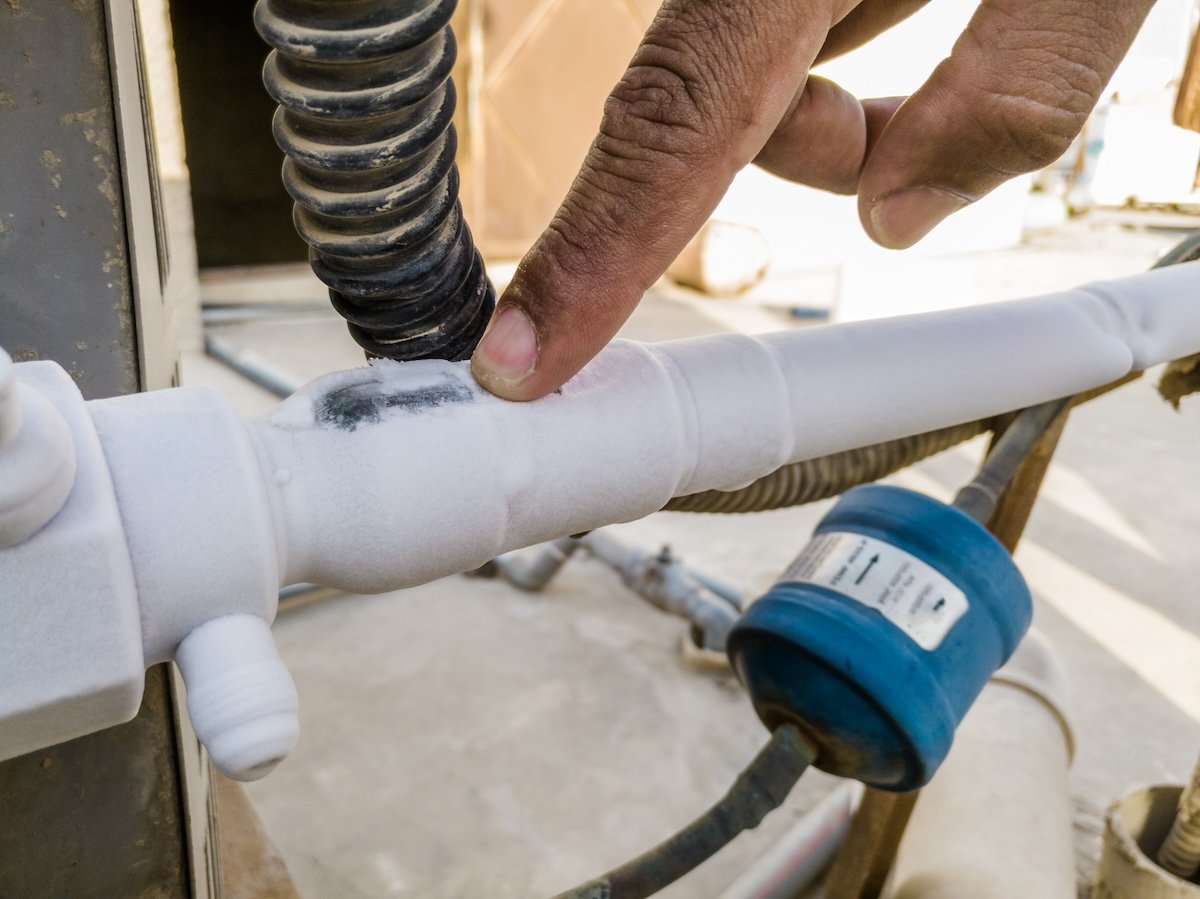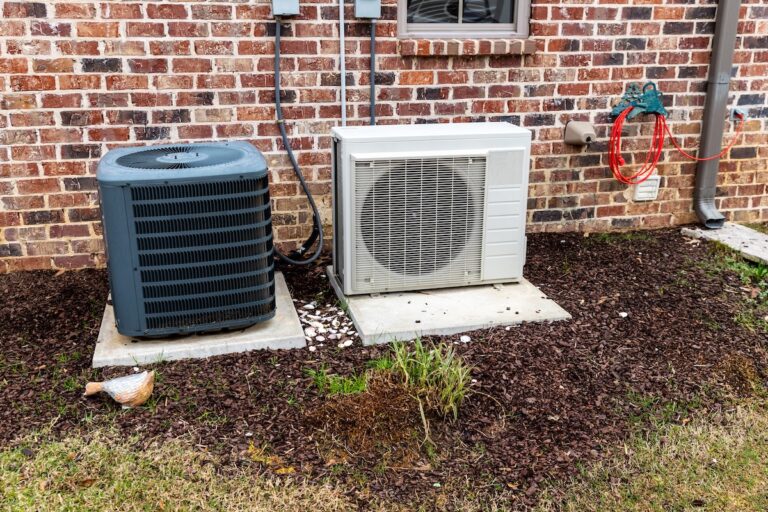
An ac freezing up in the heat of summer is one of the most frustrating scenarios a homeowner can face. Beyond the discomfort of a warm home, it can lead to costly repairs if left unaddressed. But why does your AC freeze up, and more importantly, how can you fix it?
This blog will guide you through everything you need to know about an AC freezing up, including these key points below:
- Signs your AC is about to freeze up
- 3 common causes of an AC freezing up
- Quick fixes to prevent AC freeze-ups
⚠️ Signs Your AC Is About to Freeze Up

Recognizing the early signs of an AC that’s about to freeze can save you time, money, and discomfort. Here are some common indicators to watch for:
- Weak Airflow: If you notice reduced airflow from your vents, it could be a sign that something is obstructing the system, potentially leading to a freeze-up.
- Unusual Noises: Strange hissing or bubbling sounds may indicate issues with refrigerant levels, which can contribute to ice buildup.
- Warm Air Instead of Cold: If your AC starts blowing warm or lukewarm air, it may signal that the cooling process is being compromised by an impending freeze.
- Visible Ice on Coils or Lines: Inspect your AC unit periodically—if you see frost or ice forming on the outdoor coils or refrigerant lines, freezing may already be occurring.
- Higher Humidity Levels Indoors: A drop in the system’s cooling efficiency often leads to increased indoor humidity, which can hint at a pending freeze-up.
By catching these signs early, you can take action to address the issue before it escalates. Regular maintenance and prompt attention to potential problems can keep your AC running smoothly all season long.
👉 3 Common Causes of an AC Freezing Up

To tackle the issue, it’s essential to first understand the root causes. A frozen AC may look alarming, with an icy buildup on the unit, but it’s typically linked to one of these underlying problems:
1. Restricted Airflow
Blocked or reduced airflow is one of the most common reasons an air conditioner freezes up. When air cannot flow properly through the system, the evaporator coil can become too cold, leading to condensation that turns into ice. Restricted airflow can occur due to several factors:
- Dirty air filters: Over time, air filters collect dust, debris, and other particles that block airflow. If the filter is clogged, the AC struggles to circulate air effectively, causing the coil temperature to drop below freezing.
- Blocked vents or ducts: Furniture, curtains, or other objects obstructing vents can reduce airflow. Similarly, ducts clogged with dust or debris can disrupt the system, leading to uneven cooling and frozen components.
- Fan issues: A malfunctioning fan may not circulate air properly, further contributing to restricted airflow.
Solution: Regular maintenance is key to preventing airflow problems. Check and replace air filters every 1–3 months, depending on usage and the environment (e.g., homes with pets might require more frequent changes). Inspect your vents and ensure they are open and unobstructed. If you suspect a fan issue, have it inspected and repaired by a professional technician.
2. Low Refrigerant Levels
Refrigerant is critical for the cooling process in air conditioners. It absorbs heat from the indoor air and releases it outside. However, low refrigerant levels can disrupt this process, causing the evaporator coil to become too cold and freeze over.
- Refrigerant leaks: A common cause of low refrigerant is a leak in the system. Leaks can occur due to wear and tear, corrosion, or improper installation.
- Signs of refrigerant issues: If your AC is struggling to cool your home, blowing warm air, or you hear a hissing or bubbling sound, there may be a refrigerant problem. Additionally, higher energy bills or uneven cooling can also point to a refrigerant issue.
Solution: Refrigerant problems should always be handled by a licensed HVAC professional. They will identify and repair any leaks, recharge the refrigerant to the proper levels, and ensure your system is working efficiently. Attempting to fix or add refrigerant yourself can be dangerous and may damage the AC unit further. Regular system inspections can help catch refrigerant issues early.
3. Thermostat Issues
The thermostat is the brain of your air conditioning system, controlling how often and how long it runs. If the thermostat malfunctions, it can lead to freezing problems by causing the AC to work harder than necessary.
- Incorrect settings: Setting the thermostat too low can cause your system to overwork, leading to frozen coils. This is especially common in very humid conditions when frost can build up more quickly.
- Malfunctioning thermostat: A thermostat that fails to shut off the AC at the right time can cause constant cooling, which overworks the system and allows freezing to occur. Older or outdated thermostats are more prone to such issues.
- Inconsistent temperature readings: Some thermostats may not accurately read the indoor temperature, causing the AC to run longer than needed.
Solution: Regularly check your thermostat settings and ensure they align with your comfort needs without overburdening the AC. Consider upgrading to a programmable or smart thermostat, which allows you to set schedules and maintain more precise temperature control. If you suspect your thermostat is malfunctioning, have it inspected by a professional or replaced if necessary. A properly functioning thermostat will not only prevent freezing issues but also improve energy efficiency.
🛠️ Quick Fixes to Prevent AC Freeze-ups

Prevention is key to keeping your AC in optimal condition. Here are five easy steps you can follow to maintain a freeze-free system:
Keep Filters Clean
Air filters play a critical role in maintaining proper airflow and ensuring your HVAC system runs efficiently. Over time, filters can become clogged with dust, dirt, and debris, which restricts airflow and causes the system to work harder. Replace air filters every 1-3 months, depending on usage and the type of filter. This simple step not only improves efficiency but also enhances indoor air quality.
Schedule Routine Maintenance
Regular HVAC tune-ups are essential for keeping your system in top shape. Schedule biannual maintenance—once in the spring and once in the fall. During these tune-ups, a professional technician will inspect, clean, and optimize your system to ensure it operates at peak performance. Routine maintenance helps to identify and address potential issues early, saving you from costly repairs down the line.
Check Thermostat Settings
Your thermostat settings have a significant impact on energy efficiency and system performance. Set your thermostat to a reasonable temperature, such as 68°F in cooling mode or 72°F in heating mode, to prevent overloading the system. Consider using a programmable or smart thermostat to automate temperature adjustments based on your schedule, further improving efficiency and comfort.
Ensure Refrigerant Levels Are Adequate
Refrigerant is essential for your HVAC system to cool your home effectively. Low refrigerant levels can result in poor cooling performance and increased energy usage. Hire a certified technician to inspect refrigerant levels and check for leaks. Promptly addressing any refrigerant issues ensures optimal cooling and prevents damage to your system.
Inspect and Clean Coils
The coils in your HVAC system, both evaporator and condenser, can accumulate dirt and dust over time. Dirty coils reduce airflow and cooling efficiency, forcing the system to work harder to achieve the desired temperature. Schedule professional cleaning to keep the coils in good condition. Regular coil maintenance not only boosts efficiency but also extends the lifespan of your HVAC system.
❄️ Stay Cool and Problem-Free with Thelen
When your AC starts freezing up, it’s crucial to address the issue quickly to prevent further damage and discomfort. That’s where our team at Thelen Plumbing, Heating, and Air comes in. With years of experience, reliable service, and a commitment to your comfort, we’re the trusted professionals you can count on for all your HVAC needs.
From diagnosing the problem to providing efficient, long-lasting solutions, we’ll ensure your system is running smoothly in no time. Don’t let a frozen AC disrupt your summer—contact us today for a free inspection and let us keep your home cool and stress-free!
Unlock Our Limited-Time Deals!
Take advantage of our offers on AC tune-ups, new installs, repairs, and more.
We Can’t Wait to Help Your Home!
"*" indicates required fields





